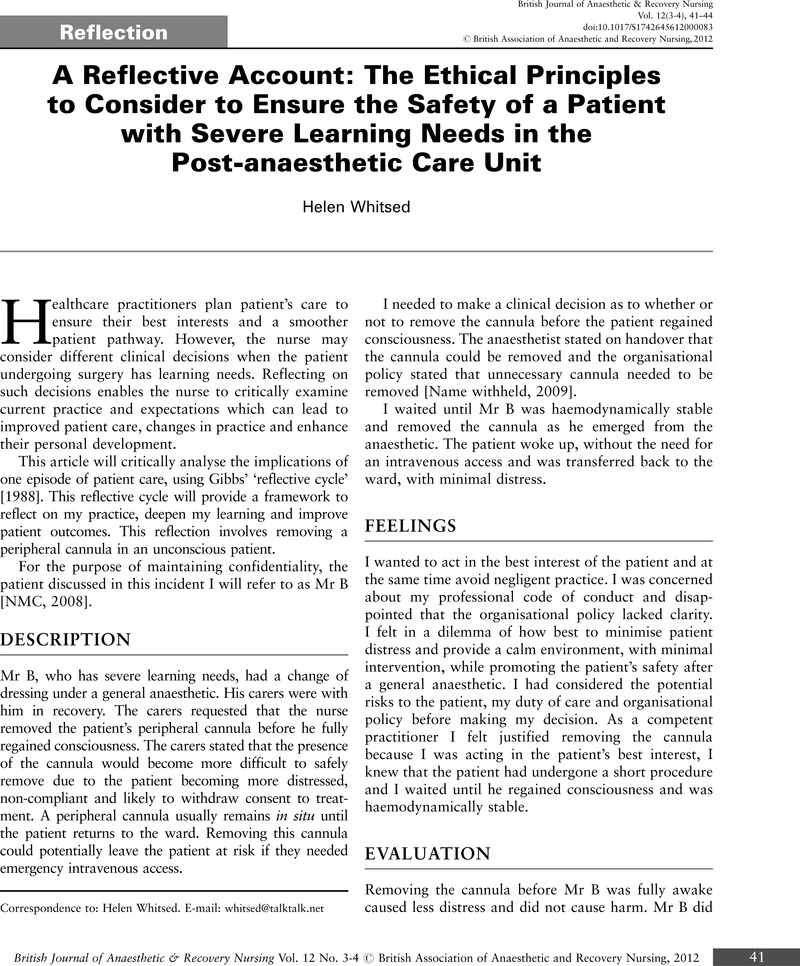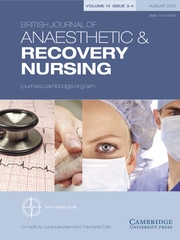No CrossRef data available.
Article contents
A Reflective Account: The Ethical Principles to Consider to Ensure the Safety of a Patient with Severe Learning Needs in the Post-anaesthetic Care Unit
Published online by Cambridge University Press: 01 August 2011
Abstract
An abstract is not available for this content so a preview has been provided. Please use the Get access link above for information on how to access this content.

- Type
- Reflection
- Information
- British Journal of Anaesthetic & Recovery Nursing , Volume 12 , Issue 3-4 , August 2011 , pp. 41 - 44
- Copyright
- Copyright © British Association of Anaesthetic and Recovery Nursing 2012
References
Fullbrook, S. The duty of care 1: compliance with directives and protocols. British Journal of Nursing 2007; 16(1): 52–53.CrossRefGoogle ScholarPubMed
Fullbrook, S. The duty of care and political expectations. Part 1: a literature review. British Journal of Nursing 2008; 17(6): 386–387.CrossRefGoogle ScholarPubMed
Gibbs, G. Learning by Doing: A Guide to Teaching and Learning Methods. Oxford: Oxford Brookes University, 1988.Google Scholar
Hind, M. Accountability and professional practice. In: Woodhead K and Wicker P (eds). A Textbook of Perioperative Care. London: Elsevier Churchill Livingstone, 2005: 3–12.Google Scholar
Howard, J, Shelly, P. Consent and associated legal issues for perioperative practioners. In: Radford M, County B and Oakley M (eds). Advancing Perioperative Practice. Cheltenham: Nelson Thornes Ltd, 2004: 202–210.Google Scholar
Humphreys, S.Patient autonomy legal and ethical issues in the post-anaesthetic unit. British Journal of Perioperative Nursing 2005; 15(10): 35–38.Google Scholar
Koubel, G. Decision-making in professional practice. In: Jasper M (ed.). Professional Development, Reflection and Decision-Making. Oxford: Blackwell Publishing, 2006: 108–134.Google Scholar
Lange, F. Nursing management of subarachnoid haemorrhage: a reflective case study. British Journal of Neuroscience Nursing 2009; 5(10): 463–470.CrossRefGoogle Scholar
Leyshon, S, Clark, LL. Legal and ethical issues in seeking the consent of adults with learning disability. British Journal of Neuroscience Nursing 2005; 1(3): 126–113.CrossRefGoogle Scholar
NHS TRUST (Name withheld, 2009) Guidelines for Discharge of Patient from PACU to Surgical Ward.Google Scholar
Nursing and Midwifery Council. The Code – Standards of Conduct, Performance and Ethics. London: NMC, 2008.Google Scholar
Nursing and Midwifery Council. Raising and Escalating Concerns. Guidance for Nurses and Midwives. London: NMC, 2010.Google Scholar
Pittaway, D. The changing role of the perioperative nurse. In: Radford M, County B and Oakley M (eds). Advancing Perioperative Practice. Cheltenham: Nelson Thornes Ltd, 2004: 1–14.Google Scholar
Reid, J. Valid consent to surgery. Dispelling the myth and establishing the evidence. British Journal of Perioperative Nursing 2003; 13(7): 405–413.Google Scholar
Reid, J. Ethical dimensions of perioperative practice. In: Woodhead K and Wicker P (eds). A Textbook of Perioperative Care. London: Elsevier Churchill Livingstone, 2005: 13–28.Google Scholar
Sutton, J. The ethics of theatre nurse practice under the microscope. British Journal of Perioperative Nursing 2003; 13(10): 405–413.Google ScholarPubMed
The Department for Constitutional Affairs: Mental Capacity Act 2005 [Online]. Available at www.legislation.gov.uk/ukpga/2005/9/contents. Accessed 1 November 2010.Google Scholar
Turner, S, Wicker, P, Hind, M. Principles of safe practice in the perioperative. In: Hind M and Wicker P (eds). Principles of Perioperative Practice. Oxford: Churchill Livingstone, 2000: 17–50.Google Scholar




